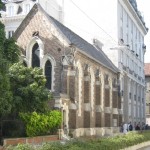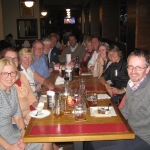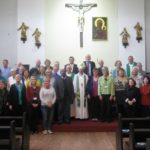
The 2009 meeting of the Eastern Archdeaconry Synod of the Diocese in Europe took place in the Kaya Prestige Hotel, Izmir, between 17.00 on Thursday 8th October until mid-afternoon on Saturday 10th October. We met in a large conference room on the second floor of the hotel and were able to set up the furniture so that one part was suitable for worship whilst the other could be used for listening to our speakers and for round-table discussion. However, like so many hotel conference rooms, there were no windows through which daylight might appear so it was good to be able to get out and walk around the city on the Friday afternoon during a two-hour break in proceedings.
In our Eucharist on Friday morning, we remembered Polycarp, Bishop of Smyrna who was martyred for his faith c155 AD, not so far from where we were meeting – Smyrna being the ancient name for what is now known as Izmir. We were reminded that Polycarp, when asked to forswear his faith and curse Christ famously declared, “I have served him for eighty-six years and he has done me no wrong; how can I blaspheme my King and my Saviour.” He was burned alive!
Our main speaker was Dr Colin Podmore, a Church Historian who has worked for the General Synod of the Church of England in various capacities since 1998. He gave three talks entitled ‘Aspects of Anglican Identity’. Not surprisingly, he has also written a book of the same title! Whilst one might not agree with everything he had to say on the topic, he certainly was a lucid a thought provoking speaker to listen to.
We also heard from David Healey, Communications Manager and General Manager of the Intercontinental Church Society (ICS), an Anglican mission society who support Christian work among English-speakers in countries where English is not the first language. ICS financially enabled the appointment in 2000, of John Philpott my predecessor as Prague Chaplain, and currently continue to meet about 10% of the Chaplaincy’s running costs as well of supporting us 100% prayerfully. Within the Eastern Archdeaconry, they also support the work of the Chaplaincies in Corfu and Kiev.
As well as speaking about the work of ICS, David also gave an illustrated talk about the impact of consumer culture upon belief and unbelief from a mission perspective. This was a revised version of a talk I’d heard him give last April at the ICS Chaplains and Families Conference. Part of his theme is one I have referred to more than once in this blog – that as Jesus said, “Life does not consist in an abundance of possessions” Luke 12 v15b.
A very important part of synod proceedings are the reports from each of the Chaplaincies. Many have financial struggles; those in St. Petersburg and Moscow have ever increasing difficulties regarding visas for chaplains and congregational members alike. Others have problems regarding their legal and tax status.
But there were also many positive things in several reports, particularly in the area of ecumenical cooperation. There are also possibilities of new Chaplaincies being established, notably in areas where increasing numbers of English-speakers are settling. One of these is on the west coast of Turkey. Members an expat group of Christians based at Didim attended the synod in an observer capacity and there is another similar group based around Bodrum. I understand that both these groups would like come under the ‘Anglican umbrella’. Our Archdeacon Patrick Curran, together with our Suffragan Bishop David Hamid, were staying on in Turkey after the synod, for a meeting with these groups to explore possibilities.
Although the synod had its serious moments, it was also a time for fellowship and fun. For the clergy, who in England would normally meet up with their near neighbours about once a month for a chapter meeting, it is rare opportunity to get together and mutually support one another. All of us in the Eastern Archdeaconry work in quite isolated situations. Geographically, my nearest colleague is my Archdeacon Patrick Curran who as well as being Archdeacon, is also Chaplain in Vienna. Vienna is about four hours from Prague either by car or train!
One of the slightly unnerving aspects of our meeting was security presence that surrounded us most of the time. There were always police in and around the hotel and often a private security man was hovering outside our meeting room. When on Saturday afternoon at the end of synod business, we set off to walk as a group to St. John’s Church, led by the Izmir Chaplain, Rev’d Ron Evans, we were followed by several police officers.
So far as one could ascertain, all this was organised by the hotel. There have in recent years been terrorist attacks in a number of tourist areas in Turkey which have usually been attributed to either the Kurdish PKK or Islamic extremists. The Turkish government is very keen to maintain and increase the number of tourists visiting the country as tourism makes a major contribution to the economy. Therefore they clearly want to deter and prevent anything that might damage the image of the country abroad. Later in our Turkish travels, we visited various tourist sites and an armed police presence was always very visible.

The final part of the synod meeting was our Sunday morning Eucharist, held in the Church of St. John the Evangelist, at which Bishop David presided. During the service, he ordained Tony Lane deacon, to serve the congregation of the Church of St. Thomas the Apostle, Kefalas, Crete. This congregation, which is now about 50 strong, was started by Tony a few years ago as half a dozen people meeting around his kitchen table. Since then he has personally built the chapel where the congregation now meet which was dedicated by Bishop Geoffrey in 2008.
Due to previous theological study, Tony was already a licensed Reader and this past year, he has undergone further training and been mentored by Canon Mike Peters, a recently retired priest from Somerset, who has spent the last six months in Crete, leading the congregation. Canon Mike was the preacher at the ordination service. The Crete congregation come under the umbrella of the Greater Athens Chaplaincy led by Canon Malcolm Bradshaw.
The Eucharist and Ordination Service were a wonderful way to conclude our synod meeting. It was followed by refreshments laid on by the Izmir congregation which we were able to enjoy in warm sunshine in the grounds of St. John’s Church.




I once vacationed in New Smyrna, Florida. I had no idea where the name came from. Now I know. Smyrna and Constantinople are great names. Why did they toss such great names?
Hi Karen – Smyrna and Constantinople are Greco-Roman names. Smyrna appears in the Bible being one of the 7 Churches to which the Book of Revelation is addressed. Constantinople is of course, named after the Emperor Constantine who converted to Christianity. With the establishment of the Republic of Turkey following the end of WW1, part of establishing a Turkish identity was to give every place a Turkish name.
It is no different to what happened at the same time with the establishment of Czechoslovakia post 1918. German names dating from the Austro-Hungarian Empire were all replaced by Czech ones. Thus Prag/Prague became Praha, the River Moldau became the Vltava and the spa towns of Marienbad and Karlsbad became Mariánské lázne and Karlovy Vary respectively.